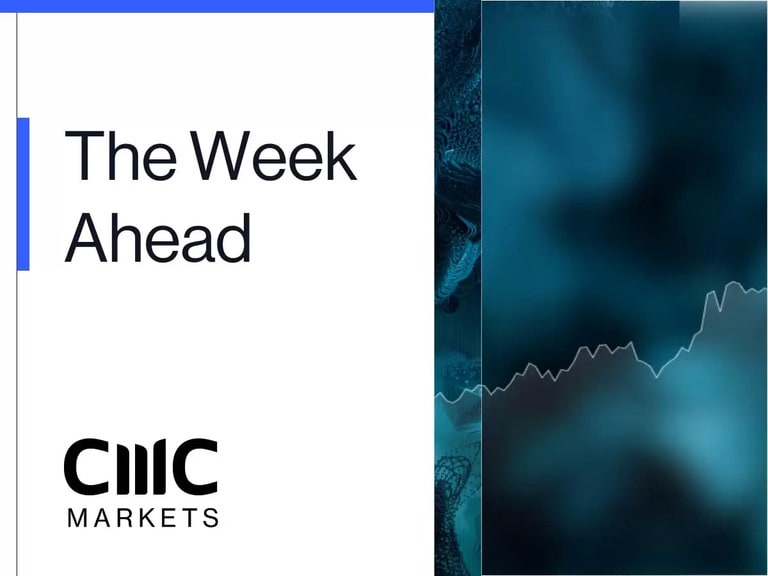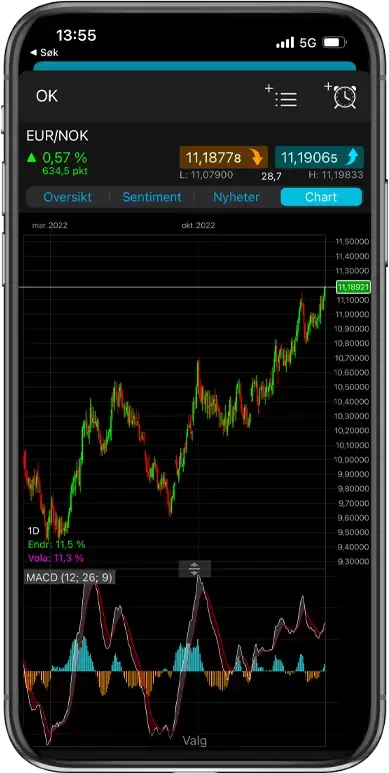Economic events to look out for this week include Thursday’s first release of the eurozone consumer price index for February, with core prices the key component to watch. On Friday, we’ll get the latest picture of economic activity in the US and globally, following improved data in January. In company news, look out for earnings updates from both sides of the Atlantic. At home, Ocado, Haleon, and ITV unveil annual results, while from the US, look out for quarterlies from the likes of AMC Entertainment and Rivian.
Read on for our pick of the key economic and company events in the week beginning 27 February:
Monday 27 February
Associated British Foods Q2 results
We’ve seen strong gains in the Associated British Foods share price since 10-year lows in September, with an over 50% rally since then. At its last set of full-year numbers, annual revenue rose by 22%, to just shy of £17bn, while adjusted profit-before-tax rose 49% to £1.35bn. For the new year, Primark said it expected adjusted operating margin to fall to lower than 8%, on the back of higher costs and keeping prices unchanged for both the winter and summer ranges.
In January, ABF reported that total group revenue increased 20% to £6.7bn, with the retail business reporting a 15% increase in revenue to £3.14bn. The business also reported strong growth in its food business, with sugar and ingredients seeing gains of in excess of 30%, with the strength of the US dollar in relation to commodity prices helping boost the underlying numbers. Cost pressures have continued to exert downward pressure on margins.
The Primark business was helped by a strong UK performance, with the retailer saying it had increased its market share to 7% of the total clothing market. European trading was also strong, with new stores in Romania and Italy said to be trading strongly. Performance across all of the retail markets was said to be ahead of expectations, which bodes well for a strong performance in Q2, although with the shares already at one-year highs a lot of the good news could already be in the price.
Tuesday 28 February
Ocado full-year results
It’s been a choppy few months for the Ocado share price, which has traded in wide range since its five-year lows back in October. The shares rallied strongly in November on the back of the deal it signed with South Korea’s Lotte Shopping, however since those peaks the air has come out of the recent rebound.
In January, Ocado shares got off to a flier, however the Q4 trading update took a lot of the fizz out of that strong start. Q4 revenue rose by 0.3% to £549.4m, well below the company’s estimate of mid-single-digit sales growth. In its defence, Ocado did warn in Q3 that Q4 sales were likely to be affected by energy cost headwinds, which would in due course weigh on profitability The news was still disappointing though, with the company warning that customer basket sizes would probably keep falling in 2023, with average basket value down 1.3% year on year.
For the full year, revenue is expected to fall by 3.8% to £2.2bn, despite an increase in full-year average selling prices of 4.4%, however a 12.1% annual decline in basket volumes has offset that. The company said it was still on target to break even on an EBITDA basis for the full fiscal year. Ocado also managed to grow its market share to 12.3%, from 11.7%, however it’s clear that margins are likely to continue to get squeezed in what is an extremely competitive groceries market.
AMC Entertainment Q4 results
AMC Entertainment has gone from being a flavour of the month meme stock, to a business which has seen its share price undergo a slow decline from levels back in August last year The cinema chain’s Q3 revenue increased by 27% to $968.4m, while losses also increased to $226.9m. The decision to split its shares and dilute its shareholders appears to have precipitated a wholesale cashout, and while it has been able to cash in on the pickup in footfall from a summer of blockbuster films, it’s still carrying huge levels of debt. AMC is also still spending more money than it’s taking in revenue, to the tune of a cash burn of $179m in Q3. While this is expected to improve in the Q4 numbers, with increased footfall as a result of the new Avatar film, as well as Wakanda Forever, the company is still expected to report losses of $0.20 a share.
HP Q1 results
When HP reported its full-year results back in November, the shares bounced initially, after it announced the loss of 6,000 jobs over three years, due to a slowdown in the PC and laptop market. HP hasn’t been alone in this regard, with Dell also announcing similar reductions in headcount in recent weeks.
In Q3, revenue came in well below expectations due to weaker demand for PCs, with that trend continuing into Q4, with revenue of $14.8bn, although profits did beat slightly at $0.85 a share. For the new fiscal year 2023, the company offered an uncertain outlook, with Q1 profit expected to come in at $0.70 a share, and full-year adjusted EPS of between $3.20 and $3.60 a share. Will Q1 offer more of the same in terms of further downgrades?
Rivian Q4 results
When Rivian reported back in Q3, there was optimism that the share price had stabilised, as the business started to ramp up its output capacity. The electric car company managed to produce 7,363 vehicles, delivering 6,584 of them. This put its total production year-to-date to over 15,000, which means Q4 will need to show delivery of at least 10,000 vehicles to meet its 25,000 annual target. The addition of a second manufacturing shift at Normal should go some way to help achieve that, and will need to given that the company has 114,000 pre-orders which it needs to meet.
Q3 revenue did fall slightly short of expectations, coming in at $536m, while the quarterly net loss was $1.7bn, or $1.57 a share. Full-year losses are still expected to be in the region of $5.4bn, and while it still has plenty of cash, the rise in costs is likely to be a problem, unless Rivian raises prices in the months ahead. Since those November numbers were released, the share price has fallen sharply to record lows. This is down to soaring US interest rates, which make the case for investing in loss-making businesses less compelling. Losses in Q4 are expected to come in at $1.91 a share.
Target Q4 results
Having warned on profit back in May last year, when it published its Q1 numbers, Target shares have struggled to recover their lost ground in subsequent quarters since then. In Q3 the underperformance continued with profit coming in at $1.54 a share, well below expectations of $2.13 a share. On revenue, the company was able to beat expectations, at $26.52bn, however profit halved from the $3.04 a year ago. Inventory levels were also high, as consumers pared back spending on discretionary items like apparel and electricals. Having missed on profit, Target also cut its guidance for Q4, projecting a modest single-digit decline in sales, while expecting operating margin of around 3%.
Wednesday 1 March
No major scheduled events
Thursday 2 March
Haleon full-year results
Since its launch on public markets in July, it’s been a rocky start for Haleon, the consumer business that was spun out of GSK, and which saw GSK management reject a £50bn bid by Unilever a year ago. It was clear then that decision was likely to prove an expensive mistake and so it has proved, although we have finally managed to recover back to the IPO levels of 330p. The shares fell as low as 244p in September over concerns about litigation with respect to Zantac, an antacid drug, which is said to cause side effects. Management has pushed back on the idea that they should shoulder liability over the antacid drug.
In the Q3 trading update, Haleon delivered a solid set of numbers, with reported revenue rising 16.1%, as well as a 12.2% rise in reported operating profit of £569m. The company also raised its full-year guidance of organic revenue growth to an increase of between 8% and 8.5%. The quarterly outperformance was driven primarily by sales of cold and flu remedies, although margins slipped 70bps to 19.7%, despite the company increasing prices. This is likely to be a key area of focus as we get set for its first full-year figures as a public company, as well as its guidance for 2023.
ITV full-year results
The ITV share price hit its lowest level in two years last September, but has since undergone a decent recovery of over 50%, helped by anticipation of a pickup in advertising revenue due to the World Cup in Qatar. In November, ITV reported a total revenue year-to-date rise of 6% from a year ago to £2.95bn, however the advertising business proved once again to be somewhat of an Achilles heel. The Q3 numbers were expected to be disappointing, and were, falling 2% for the year-to-date at £1.56bn, with July down 9%, August down 21%, and September down 14%, compared to the same period in 2021.
Total advertising revenue is expected to decline between 1% and 1.5% over the full year, with October down 9% and November expected to be up 3%, while December is expected to be 5% to 10% higher, with the World Cup likely to offer a decent pick-me-up. The underperformance in advertising was offset by the outperformance of ITV Studios, which saw a 6% increase in revenue to £1.39bn, offering encouragement as the production part of the business looks to generate almost 50% of total revenue. The outperformance of this business has prompted some speculation that ITV, or more to the point its studios business, might be in the crosshairs of possible bid speculation.
We’ll also find out how well ITV’s new ITVX ad-funded offering has performed after rolling out on 8 December. In January, ITV announced that its revamped ITVX service delivered a 55% increase in viewing in December, as well as a 65% increase in online users. ITV hopes to deliver at least £750m in digital revenue by 2026.
EU flash CPI (February)
Much was made of the fact that the January consumer price index (CPI) dropped sharply, from 9.2% in December to 8.6% in January, with many taking the view that we could continue to see sharp declines in the headline numbers over the coming months. It’s certainly an encouraging development, along with the sharp declines in the headline producer price index (PPI). However, these sharp falls aren’t being reflected in core prices, and wages are still rising. When the January CPI data was released, core CPI was at a record high of 5.2%. It has since been revised up to 5.3%. This is likely to be a big concern for the European Central Bank, and any lack of progress here is likely to be the driving force going forward, rather than continued weakness in headline inflation.
Friday 3 March
US ISM services index (February)
While a lot of the attention last month was around the January non-farm payrolls report, the January ISM report was almost a sideshow, but it could be argued it was just as important in shaping the narrative of a resilient US economy. ISM services index jumped from 49.6 in December to 55.2, while new orders also surged, to 60.4 from 45.2, their highest level since August. Prices paid remained steady at 67.8, while employment was steady at 50.0. The resilience of these numbers, along with bumper retail sales, showed the US economy surged in January. The question now is, was this sustained in February. A slowdown to 54.2 from 55.2 is expected, with the employment component also likely to be a leading indicator for next week’s delayed payrolls report.
Global services PMIs (February)
The most recent January PMI data all pointed to an improvement in economic activity at the start of the new year. The slightly improved economic outlook in Europe and the UK is expected to continue to be reflected in the latest services PMI numbers from Spain, Italy, France, Germany, and the UK, which are all expected to rise on the back of the recent decline in energy prices, which has eased the pressure on consumer wallets. Germany managed to rebound back into expansion territory in January, while UK data also improved, though it remains in contraction territory. The hope is that all of these improvements continue into the February figures.
INDEX DIVIDEND SCHEDULE
Dividend payments from an index's constituent shares can affect your trading account. View this week's index dividend schedule.
SELECTED COMPANY RESULTS
| MONDAY 27 FEBRUARY | RESULTS |
| Associated British Foods (UK) | Q2 |
| Bunzl (UK) | Full-year |
| Vimeo (US) | Q4 |
| Workday (US) | Q4 |
| TUESDAY 28 FEBRUARY | RESULTS |
| abrdn (UK) | Full-year |
| AMC Entertainment Holdings (US) | Q4 |
| Dorman Products (US) | Q4 |
| Duolingo (US) | Q4 |
| Eventbrite (US) | Q4 |
| First Solar (US) | Q4 |
| HP (US) | Q1 |
| Ocado Group (UK) | Full-year |
| Payoneer Global (US) | Q4 |
| Rivian Automotive (US) | Q4 |
| SeaWorld Entertainment (US) | Q4 |
| St James's Place (UK) | Full-year |
| Target (US) | Q4 |
| Travis Perkins (UK) | Full-year |
| Virgin Galactic Holdings (US) | Q4 |
| WEDNESDAY 1 MARCH | RESULTS |
| Abercrombie & Fitch (US) | Q4 |
| American Eagle Outfitters (US) | Q4 |
| Aston Martin Lagonda (UK) | Full-year |
| Lowe's Cos (US) | Q4 |
| Persimmon (UK) | Full-year |
| Reckitt Benckiser (UK) | Full-year |
| Ricardo (UK) | Half-year |
| Snowflake (US) | Q4 |
| Weir Group (UK) | Full-year |
| Wendy's (US) | Q4 |
| THURSDAY 2 MARCH | RESULTS |
| Beazley (UK) | Full-year |
| Best Buy (US) | Q4 |
| Broadcom (US) | Q1 |
| Capita (UK) | Full-year |
| Haleon (UK) | Full-year |
| ITV (UK) | Full-year |
| Kroger (US) | Q4 |
| London Stock Exchange Group (UK) | Full-year |
| Macy's (US) | Q4 |
| Melrose Industries (UK) | Full-year |
| Metro Bank (UK) | Full-year |
| National Express Group (UK) | Full-year |
| Portillo's (US) | Q4 |
| Schroders (UK) | Full-year |
| Taylor Wimpey (UK) | Full-year |
| Victoria's Secret (US) | Q4 |
| VMware (US) | Q4 |
| FRIDAY 3 MARCH | RESULTS |
| IMI (UK) | Full-year |
| inTEST (US) | Q4 |
| Pearson (UK) | Full-year |
| Rightmove (UK) | Full-year |
| Stereotaxis (US) | Q4 |
Note: While we check all dates carefully to ensure that they are correct at the time of writing, company announcements are subject to change.
CMC Markets er en ‘execution-only service’ leverandør. Dette materialet (uansett om det uttaler seg om meninger eller ikke) er kun til generell informasjon, og tar ikke hensyn til dine personlige forhold eller mål. Ingenting i dette materialet er (eller bør anses å være) økonomiske, investeringer eller andre råd som avhengighet bør plasseres på. Ingen mening gitt i materialet utgjør en anbefaling fra CMC Markets eller forfatteren om at en bestemt investering, sikkerhet, transaksjon eller investeringsstrategi. Denne informasjonen er ikke utarbeidet i samsvar med regelverket for investeringsanalyser. Selv om vi ikke uttrykkelig er forhindret fra å opptre før vi har gitt dette innholdet, prøver vi ikke å dra nytte av det før det blir formidlet.






